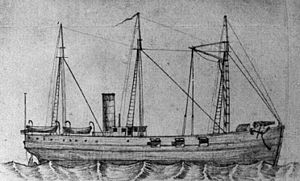USS Albatross (1861)

Sketch of Albatross by William M. C. Philbrick, depicting her off Mobile, Alabama, on 25 September 1863.
|
|
| History | |
|---|---|
|
|
|
| Namesake: | the bird Albatross |
| Launched: | 1858 at Mystic, Connecticut |
| Acquired: | 23 May 1861 at Brooklyn, New York |
| Commissioned: | 25 June 1861 at the New York Navy Yard |
| Decommissioned: | 11 August 1865 at the Boston Navy Yard |
| Struck: | 1865 (est.) |
| Fate: | sold 8 September 1865 at Boston, Massachusetts |
| General characteristics | |
| Type: | screw steamer |
| Displacement: | 378 long tons (384 t) |
| Length: | 150 ft (46 m) |
| Beam: | 30 ft (9.1 m) |
| Depth of hold: | 10 ft (3.0 m) |
| Propulsion: | steam engine, screw-propelled |
| Sail plan: | rigged as a three-masted schooner |
| Speed: | 11 knots (20 km/h; 13 mph) |
| Complement: | not known |
| Armament: |
|
USS Albatross (1858) was a screw steamer rigged as a three-masted schooner acquired by the Union Navy during the beginning of the American Civil War. She was outfitted as a gunboat with heavy guns and used in the Union blockade of the waterways of the Confederate States of America.
Albatross was built at Mystic, Connecticut in 1858. She was purchased by the Navy at Brooklyn, New York on 23 May 1861, and commissioned at the New York Navy Yard on 25 June 1861, Commander George A. Prentiss in command.
Acquired during the Union Navy's efforts to expand the fleet early in the civil war to carry out the blockade of the Confederate coast established by U.S. President Abraham Lincoln's proclamation of 19 April, Albatross was assigned to the Atlantic Blockading Squadron. She soon sailed for the Virginia Capes, and reported to the squadron’s commander, Flag Officer Silas Stringham, at Hampton Roads, Virginia on 1 July 1861.
Following a week's service in the Chesapeake Bay along its eastern shore and off the mouth of the Rappahannock River, the steamer rounded Cape Henry on 10 July and proceeded south to waters outside the bar off Hatteras Inlet to assist in sealing off the North Carolina coast. The ship's first action came on 11 July after a Confederate shore battery near Oregon Inlet opened fire on her. She answered with all her guns, knocked out one of the Confederate cannon, and drove the Southern soldiers from the area.
...
Wikipedia
